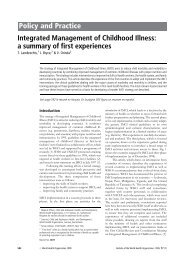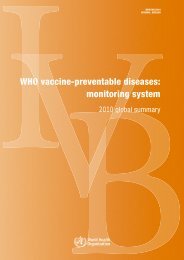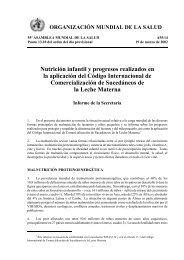IPDE - Extranet Systems - World Health Organization
IPDE - Extranet Systems - World Health Organization
IPDE - Extranet Systems - World Health Organization
You also want an ePaper? Increase the reach of your titles
YUMPU automatically turns print PDFs into web optimized ePapers that Google loves.
Review of diagnostic instruments for<br />
the assessment of personality<br />
disorders<br />
Armand W. Loranger<br />
This chapter is intended to acquaint the reader with most of the instruments<br />
specifically designed to diagnose the personality disorders (PDs).<br />
The review makes no pretense at completeness. Preference is given to<br />
interviews and inventories that have also been used by investigators<br />
other than the developers themselves. The International Personality<br />
Disorder Examination (<strong>IPDE</strong>) is not included, since most of this volume<br />
(see Part 11) is devoted to it. The account is mainly descriptive rather than<br />
analytical. For more of the latter, the interested reader will find<br />
Zimmennan's recent review especially informative.'<br />
There is an axiom in psychometrics that the more closely a test samples<br />
the criterion it attempts to predict, the more valid it is likely to be.<br />
Historically, the identification and delineation of PDs has emerged primarily<br />
from clinical observation. Therefore, it should not be surprising if<br />
diagnoses based on semistructured clinical interviews approximate clinical<br />
diagnoses more than those based on self-administered inventories.<br />
The obvious limitation of the latter is their inability to provide the observations,<br />
cross-examination, and judgement of the experienced clinician.<br />
Except for the dementias and mental retardation, there is nothing in the<br />
history of clinical psychological tests to warrant their being viewed as a<br />
close approximation to a psychiatric diagnosis.<br />
Self-administered tests, however, may be valuable as economical<br />
screening devices. The literahlre suggests that personality disorder inventories<br />
are especially prone to false-positive diagn~ses.~ Of course this is<br />
precisely what one expects from a screening instrument, where the main<br />
concern is to guard against an intolerable number of false-negatives.<br />
Because dimensional information is often used to supplement categorical<br />
PD diagnoses, inventories may also prove useful in estimating the extent<br />
to which an individual shares certain maladaptive traits with those who<br />
fulfil1 the categorical requirements for a particular type of PD. The estimates,<br />
however, are likely to be no more than moderately correlated with<br />
dimensional assessments based on semistructured clinical interviews.

















